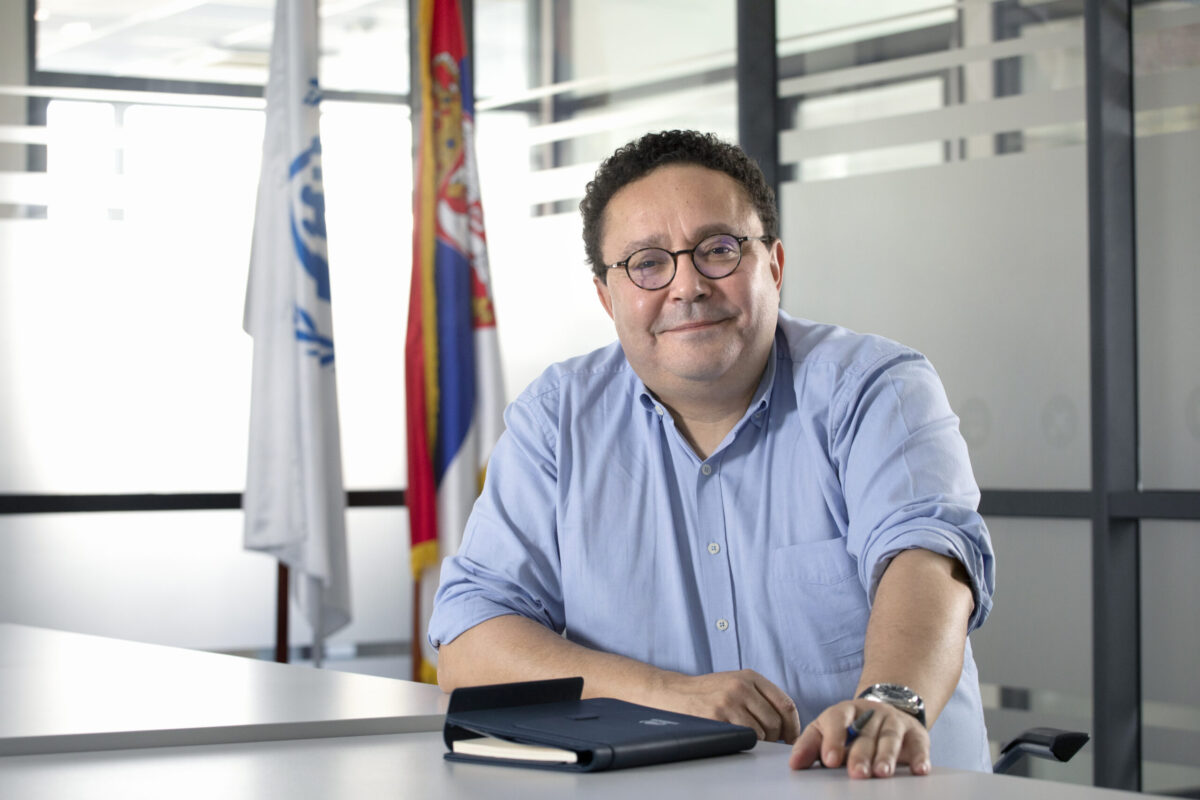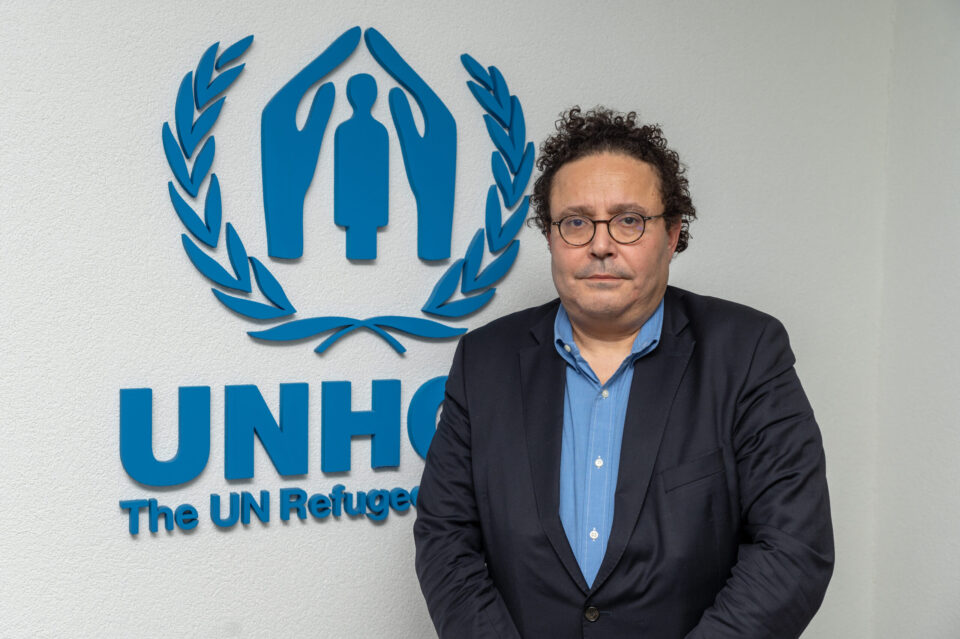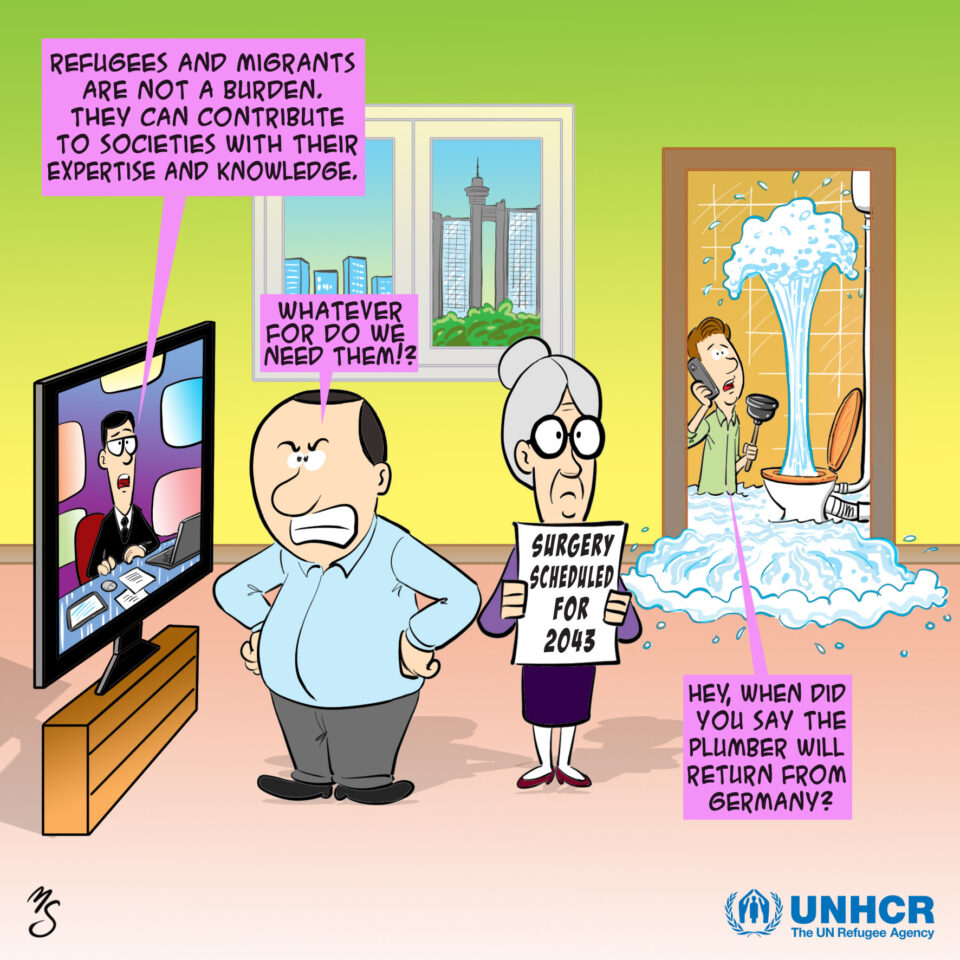Most refugees hope for the restoration of the rule of law in their own countries, to be able to return home one day in safety and dignity
 As part of our new series Refugee Stories, we are publishing an interview with the UNHCR Director for Serbia, Mr. Soufiane Adjali, in which you will learn about the current situation of refugees in our country and how UNHCR helps refugees through its mechanisms.
As part of our new series Refugee Stories, we are publishing an interview with the UNHCR Director for Serbia, Mr. Soufiane Adjali, in which you will learn about the current situation of refugees in our country and how UNHCR helps refugees through its mechanisms.
You’ve worked in many parts of the world, the Americas, Africa, Middle East, and Europe, in particular the Balkans. What would you say is the common denominator from the aspect of refugee movements?
The common denominator for UNHCR, the UN Refugee Agency, is that people who are on the move are human beings, each one of them with their own personal story who deserve full respect for their human rights and dignity. There are those who have left their home and family out of a personal decision to emigrate, and so they have the option to return home. And there are those, refugees, who have left their home, land, family, friends, country to protect themselves from persecution, war, conflict, violence, or human rights violations and who seek safety in another country. Most refugees hope for the restoration of the rule of law in their own countries, to be able to return home one day in safety and dignity. When considering asylum and refugee movements, it is important to try to imagine yourself in such a situation, as it is possible for anyone to find themselves forced to flee their homes and in need of international protection in other countries.
What is the current situation in Serbia?
I would say that a lot is being done and one can’t forget the welcoming policy that the Serbian people and government had during the crisis in 2015.
However, with time different approaches are needed. Against this backdrop, as well as capitalizing on the tradition of hosting forcibly displaced people, UNHCR’s strategy aims to support the strengthening of national asylum systems and related processes in the Western Balkans to provide protection and viable solutions to refugees and asylum- seekers. In coordination with all concerned partners, UNHCR is focusing on improving protection and response capacity, and creating conditions for solutions for refugees.
Since 2008 when the Law on Asylum – the first ever in Serbia – came into effect, more than 1,500 people applied for asylum in Serbia. Many have abandoned the asylum procedure and their cases were closed, while others were found not to be in need of international protection. Currently, there are only 248 refugees from outside the region in Serbia. Over the past 10 years, the highest number of people granted refugee status was in 2016 – just 42 people; in 2019 only 35 and in 2022 just 30 people. In 2024 so far, only one person has been granted international protection. However, it is laudable that Serbia, following in the footsteps of the EU, granted temporary protection to 2,664 refugees from Ukraine.
One can’t forget the welcoming policy that the Serbian people and government had during the crisis in 2015
UNHCR Serbia will continue to work with the Government and will seek for a strengthened and well-functioning asylum system. UNHCR hopes to see increased capacities and field presence of the Asylum Office and an increasing number of people referred to asylum procedures and receiving international protection, as well as improved quality of documents provided to asylum-seekers and refugees to ease their everyday life and access to services.
UNHCR very much welcomes the fact that Serbia has started issuing travel documents to refugees, which is a significant step in furthering the enjoyment of fundamental human rights, in particular freedom of movement for refugees for reasons such as education and professional purposes.
How does UNHCR support integration of refugees and asylum-seekers in Serbia? What is being done in terms of support for their pursuits in education?
The relatively small number of people claiming asylum and who are granted international protection in Serbia makes it possible to explore innovative and individualized approaches to inclusion and integration, taking into consideration specific situations, needs and individual skill sets. Moreover, the significant emigration of nationals from the Western Balkans to the EU has increased the demand for labour in certain localities, which provides opportunities to support refugees if they are willing to remain and access labour markets.
Providing fair inclusion and integration opportunities is of paramount importance – it underpins refugees’ rights and responsibilities as well as impacts on their self-reliance and ability to contribute to the Serbian society with their skills, talents and knowledge.
In Serbia, this endeavor entails UNHCR’s close collaboration with the Serbian Commissariat for Refugees and Migration, relevant ministries, academia, development agencies and, increasingly, the private sector.
Education and employment are the key pillars in this regard. In cooperation with the Qualifications Agency and the Commissariat, formalized through an agreement, UNHCR supports diploma recognition for refugees in Serbia and their inclusion into the education system, as well as life-long learning and career guidance.
UNHCR very much welcomes the fact that Serbia has started issuing travel documents to refugees
Moreover, for people who do not have their diplomas due to circumstances surrounding their forced displacement, UNHCR collaborates with the Ministry of Education to support Serbia’s participation in the Education Qualification Passport for Refugees initiative. It allows refugees to validate their educational qualifications, even in the absence of formal documentation. This facilitates their access to education and employment.
Additionally, UNHCR brought the DAFI scholarship program to Serbia in 2021, enabling the first refugees here to access public tertiary education. UNHCR is proud of the five university students who are currently successfully studying in Serbian.
They are pursuing education at the Faculty of Applied Arts, specializing in applied painting and contemporary clothing, the Faculty of Chemistry focusing on biochemistry, and the College of Health Sciences aspiring to become professional occupational therapists and dental prosthetists. They are already taking a very active role in their communities, together with their faculties and peers. But more needs to be done to make them self-sustainable… it requires attention from all the civil society players.
 Engaging in educational initiatives requires collaboration with educational institutions. How does UNHCR’s collaboration with academia underscore its commitment to supporting refugee education?
Engaging in educational initiatives requires collaboration with educational institutions. How does UNHCR’s collaboration with academia underscore its commitment to supporting refugee education?
The faculties already mentioned should be commended for the meaningful partnerships, where refugee students enjoy full support of their professors and fellow students.
UNHCR’s joint work with academia is also focused on creating avenues for young Serbian citizens to understand better the situation and rights of refugees, as well as to meet their peers from diverse and rich cultural backgrounds.
For example, almost 100 seniors of the Faculty of Philology in Belgrade have completed a course on cultural mediation, which UNHCR established in cooperation with the Faculty and another partner, the Crisis Response and Policy Centre.
For students, this presents a new opportunity, offering diverse possibilities that ignite their eagerness to learn. UNHCR is now working on including cultural mediation in refugee contexts as an accredited subject.
Students of law in Belgrade and Novi Sad have been immersed in the fundamentals of refugee law for more than 18 years through the legal clinics that UNHCR engages with. Professor Ivana Krstić from the Belgrade Law Faculty became a member of the De Mello Chair initiative – an important international network of universities and faculties with a strong commitment to support refugees and advocate for their rights. These are just a few of the partnerships and agreements that UNHCE has established with academia.
You’ve highlighted employment as another key pillar of successful integration. How important is refugee employment to the forcibly displaced persons, but also for the labor market in Serbia?
The prospect of dignified employment is of far-reaching significance for refugees, extending beyond mere economic considerations. It allows refugees to forge closer bonds with the local community, enrich the fabric of the society and contribute to the economy.
On the other hand, there are some gaps in the Serbian labour market that may be bridged with refugee employment, particularly given the recent legislative amendments. Notably, refugees and asylum-seekers are now exempt from the requirement to obtain work permits, which greatly facilitates their access to jobs and helps them contribute to the local economy more efficiently.
To streamline this process, UNHCR works in synergy with the National Employment Service, as well as the private sector. UNHCR collaborates on a daily basis with close to 50 employers, who are open for providing decent employment opportunities to refugees.
Additionally, UNHCR provides vocational trainings to refugees, tools and equipment for income generation, as well as Serbian language classes, and other support for inclusion and integration.
 #ForRefugees initiative was launched last year, gathering socially responsible businesses in supporting refugees for the first time in Serbia. Can you tell us more about this initiative?
#ForRefugees initiative was launched last year, gathering socially responsible businesses in supporting refugees for the first time in Serbia. Can you tell us more about this initiative?
In June 2023, together with our partners IKEA, UNHCR launched the #ForRefugees private sector network whose current 11 members – business associations and companies – support refugees through employment and internships, education and trainings, product and expert time donations, advocacy and other means.
Engagement within the network offers benefits to refugees as well as to its members, facilitating enhanced operations, a deeper commitment to local communities, fostering diversity and inclusion, and advancing the attainment of the sustainable development goals. Those forced to flee their homelands are starting their lives from scratch in Serbia and deserve the support of the entire society. The private sector has significant potential to play a pivotal role in creating a brighter future for them. Conversely, refugees can bolster the private sector, leveraging their skills, talents, diverse knowledge and experiences.
UNHCR launched the #ForRefugees private sector network whose members – business associations and companies – support refugees through employment and internships, education and trainings, product and expert time donations, advocacy and other means
As part of these endeavors, UNHCR is currently planning a conference aimed at amplifying the understanding of and awareness regarding the prospects within the #ForRefugees private sector network. This event will also serve as a platform to connect refugees and the private sector directly, presenting refugees’ input on how businesses can contribute to and assist with their well-being and integration.
UNHCR is extremely grateful to all the business actors who have recognized refugees as one of the most vulnerable groups and opened doors to support their new beginnings.
Your organisation is active in local communities beyond reception and asylum centres. What does UNHCR see as an added value in such intervention?
Direct and continued exchange with local communities is important to enhance understanding and trust between them, supports inclusion and maximizes the human capital of refugees. The citizens of Serbia have been hosting refugees and other forcibly displaced people for decades. Recognizing knowledge, experience and the expertise of both refugee and host communities, UNHCR Serbia and its partners systematically reach out to, consult with, and mobilize all parties across the country.
Inclusion of refugees in host communities includes strengthening the dialogue between them and the local population; boosting self-esteem, independence, and social-economic skills of members of all affected communities; raising awareness about the challenges and sensitizing the communities on all the available and potential opportunities.